新标准英语第六册模块2 Unit 1
新标准英语第六册m1u2
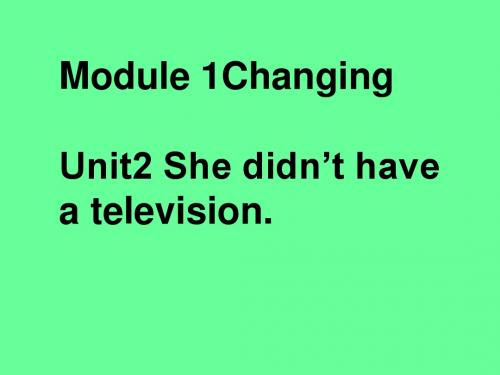
lady fire radio telephone field hope
an old lady
on a fire
radio
telephone
In the fields
重点短语
a telephone programme . last night an old lady talk about on a fire in the fields
Module 1Changing Unit2 She didn’t have a television.
知识与技能目标: (1)学生能够掌握新单词fire, radio telephone, field, hope (2) 学生能够掌握音标,字母组合ai/ay, al/au, ar 的发音规则。 (3)学生能够掌握含有时态一般过去时的句子:She didn’t have a television. She worked in the fields. 过程与方法目标: 围绕重点句型展开教学使学生在情景中掌握教学内容,培养学生自 主学习英语的能力和运用英语分析、解决问题的能力,以及交流和 合作的能力。 通过会话表演、小组比赛、游戏等活动多角度激发学生自主探究学 习的积极性,培养学生学习英语的兴趣。 情感态度价值观目标: (1)使学生体验学习、参与、合作、竞争的乐趣。 (2)比较过去与现在的生活体会到我们现在生活在幸福的社会主 义,让学生感觉到社会主义就是好,培养学生的爱国主义情操。
一般过去时态
I watched a telephone programme about China last night.
An old lady talked about her life many years ago.
(一)根据汉语意思完成句子。5分钟完成 1. 昨天晚上我看了一个关于中国的电视节 目。 I ___ ___ _ _ _ _ last night . 2. 一个老夫人谈论了她许多年以前的生活。 An old lady __ ___ her life many years ago . 3. 她用炉火做饭。 She cooked ____ _______ _________. 4. 她在田地里工作。 She worked ___ __ ___ .
新标准英语三年级起点第六册m1u2教案

新标准英语三年级起点第六册m1u2教案新标准英语三年级起点第六册m1u2教案新标准英语三年级起点第六册教案 Module 1 Changing Unit 2 She didn’t have a television. Teaching objectives: 1. Word and phrases: fire, radio, telephone, field, hope. 2. Sentences: She worked in the fields. She didn’t have a tel evision. 3. Grammar: Talk about the life of past and now. Teaching procedures: 一.Warming up. 1. Greetings. 2. Act out last text. 3. Free talk: Compare ‘Old China and New China.’ 二.Lead in Yesterday, Lingling saw the programme about China, she missed her grandmother very much. So she writes a letter for Daming, tells about that programme and her feeling. 三.New teaching. 1. Show some questions. a. What programme did Lingling watch last night? b. What was the old lady’s lifelike many years ago? c. Who does Lingling miss? 2. Listen to the tape-recorder and find answers. 3.Learn new words. a. Show some object and cards. b.Correct pronunciation. c. Practise new words in different kinds of method. 4. Listen to the tape-recorder and act out it. 四.Practise 1. Play a game. Put nine cards on the desk. Two students use cards to make dialogue. For exle: A: Where was he/she sevendays ago? B: He/She was … A: What did he/she do there? B: He/She … 2. Do A B Unit 2 exercise1. a. Listen to the tape. b. Understand generalization. c. Chooseright answer. 五.Homework Introduce the great changes of our hometown/school/home.。
外研版新标准小学英语六年级上册Module 2 Unit 1 Chinatown in America说课稿
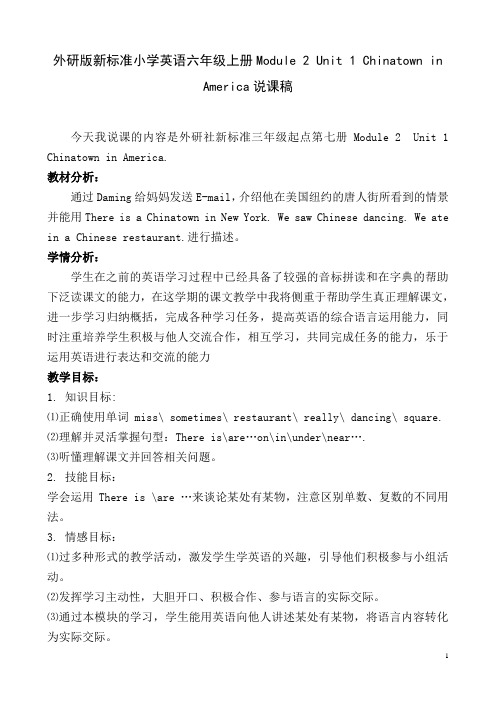
外研版新标准小学英语六年级上册Module 2 Unit 1 Chinatown inAmerica说课稿今天我说课的内容是外研社新标准三年级起点第七册Module 2 Unit 1 Chinatown in America.教材分析:通过Daming给妈妈发送E-mail,介绍他在美国纽约的唐人街所看到的情景并能用There is a Chinatown in New York. We saw Chinese dancing. We ate in a Chinese restaurant.进行描述。
学情分析:学生在之前的英语学习过程中已经具备了较强的音标拼读和在字典的帮助下泛读课文的能力,在这学期的课文教学中我将侧重于帮助学生真正理解课文,进一步学习归纳概括,完成各种学习任务,提高英语的综合语言运用能力,同时注重培养学生积极与他人交流合作,相互学习,共同完成任务的能力,乐于运用英语进行表达和交流的能力教学目标:1. 知识目标:⑴正确使用单词 miss\ sometimes\ restaurant\ really\ dancing\ square.⑵理解并灵活掌握句型:There is\are…on\in\under\near….⑶听懂理解课文并回答相关问题。
2. 技能目标:学会运用There is \are …来谈论某处有某物,注意区别单数、复数的不同用法。
3. 情感目标:⑴过多种形式的教学活动,激发学生学英语的兴趣,引导他们积极参与小组活动。
⑵发挥学习主动性,大胆开口、积极合作、参与语言的实际交际。
⑶通过本模块的学习,学生能用英语向他人讲述某处有某物,将语言内容转化为实际交际。
教学重点:1.能听,说, 读、写单词 : miss\ sometimes\ restaurant\ really\ dancing\ square.2.能理解并掌握句型: There is\are…on\in\under\near….3.让学生通过学习,学会用英语讲述某处有某物.教学难点:1.能理解并灵活使用句型:There is\are…on\in\under\near….2.学会运用所学语言描述某处有某物。
新标准大学英语综合教程2 Unit1课后答案
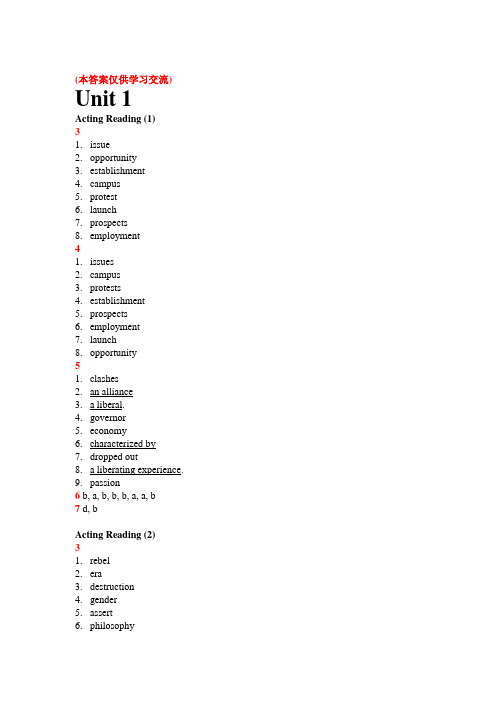
(本答案仅供学习交流) Unit 1Acting Reading (1)31.issue2.opportunity3.establishment4.campus5.protestunch7.prospects8.employment41.issues2.campus3.protests4.establishment5.prospects6.employmentunch8.opportunity51.clashes2.an alliance3. a liberal.ernor5.economy6.characterized by7.dropped out8. a liberating experience.9.passion6 b, a, b, b, b, a, a, b7 d, bActing Reading (2)31.rebel2.era3.destruction4.gender5.assert6.philosophy7.industrial41.rebel2.assert3.era4.Industrial5.philosophy6.gender7.destruction5a, a, a, a, b, a, b, b61.critical2.critical3.critical4.approving or critical5.critical or approving6.approving7 b, bLanguage in use1ernment2.Postmodernism3.development4.individualism5.agreement6.investment7.Sexism8.romanticism21.The world has changed a lot since the 1960s, and so have universities.2.I really enjoyed my years at university, and so did Jackie.3.Choosing the right course is always a major problem for new students, and so isorganizing one’s time on campus.4.I’m thinking of going to the lecture on post-colonial literature, and so is Li Ming.5.I think the facilities in our college have improved over the last few years, and sohas the teaching.6.We can access the Internet in our student hostel, and so can everyone else oncampus.7.I’m not very interested in politics, nor are my friends.8.I won’t be doing much tonight, nor will my roommate.31.Starting out at college means meeting lots of interesting people.2.Going to bed too late means not being able to concentrate the next day.3.Doing a course in Lit Theory means spending a lot of time on difficult subjects.4.Being interested in literature means having an open mind about other ways oflife.5.Protesting against the Vietnam War in the 1960s meant going out onto the streets.6.Going to college today means spending a lot of time thinking about what you willdo afterwards.41.在欧洲的大学校园里,大学生以新的姿态和激情投入到争取自由和正义的事业中去,大规模的社会主义或共产主义运动引发了他们与当权者之间日益升级的暴力冲突。
新标准小学英语第六册Module精选Unit教案
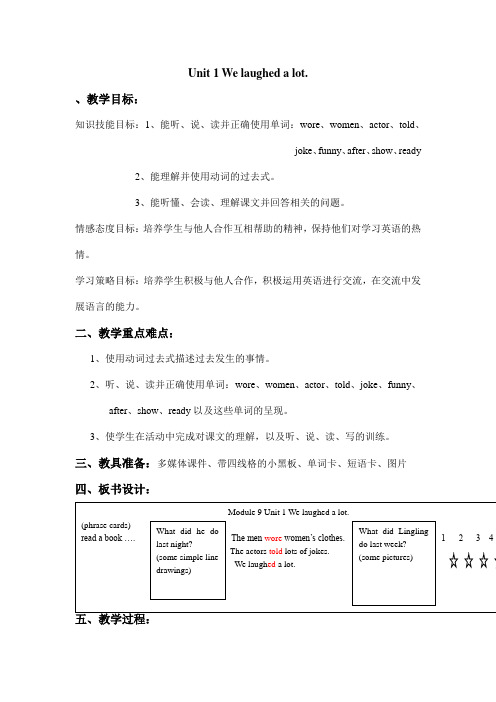
Unit 1 We laughed a lot.
、教学目标:
知识技能目标:1、能听、说、读并正确使用单词:wore、women、actor、told、
joke、funny、after、show、ready
2、能理解并使用动词的过去式。
3、能听懂、会读、理解课文并回答相关的问题。
情感态度目标:培养学生与他人合作互相帮助的精神,保持他们对学习英语的热情。
学习策略目标:培养学生积极与他人合作,积极运用英语进行交流,在交流中发展语言的能力。
二、教学重点难点:
1、使用动词过去式描述过去发生的事情。
2、听、说、读并正确使用单词:wore、women、actor、told、joke、funny、
after、show、ready以及这些单词的呈现。
3、使学生在活动中完成对课文的理解,以及听、说、读、写的训练。
三、教具准备:多媒体课件、带四线格的小黑板、单词卡、短语卡、图片
四、板书设计:。
新标准大学英语综合教程二unit1课后习题答案
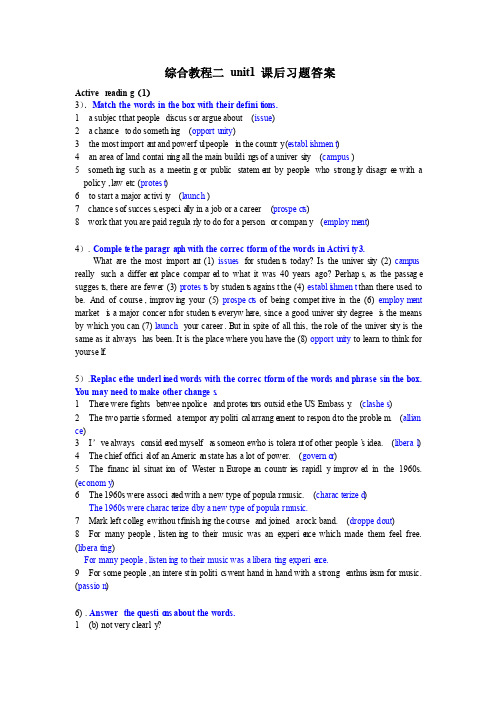
综合教程二unit1 课后习题答案Activer eading(1)3).Match the words in the box with their definitions.1 a subject that peopledi scuss or argue about (issue)2 a chanceto do somethi ng (opportu nity)3 the most importa nt and powerfu l peoplei n the country (establi shment)4 an area of land contain i ng all the main buildin gs of a universi ty (campus)5 somethi ng such as a meeting or publicstateme nt by people who strongl y disagre e with a policy, law etc (protest)6 to start a major activit y (launch)7 chances of success, especia l ly in a job or a career(prospect s)8 work that you are paid regularl y to do for a personor company(employm ent)4). Complete the paragrap h with the correct form of the words in Activity 3.What are the most importa nt (1)issuesfor student s today? Is the universi ty (2)campusreallysuch a differe nt place compare d to what it was 40 years ago? Perhaps, as the passage suggest s, there are fewer (3) protest s by student s against the (4) establi s hment than there used to be. And of course, improvi ng your (5)prospect s of being competi tive in the (6) employm ent marketi s a major concern for student s everywh ere, since a good universi ty degreei s the means by which you can (7) launchyour career. But in spite of all this, the role of the universi ty is the same as it alwayshas been. It is the place where you have the (8) opportu ni ty to learn to think for yoursel f.5).Replace the underli ned words with the correct form of the words and phrases in the box. Y ou may need to make other changes.1 There were fightsbetween policeand protest ors outside the US Embassy. (clashes)2 The two parties formed a tempora ry political arrange ment to respond to the problem. (alliance)3 I’ve alwaysconside red myselfa s someone who is toleran t of other people’s idea. (liberal)4 The chief officia l of an America n state has a lot of power. (governo r)5 The financi al situati on of Western Europea n countri es rapidly improve d in the 1960s. (economy)6 The 1960s were associa ted with a new type of popular music. (characterized)The 1960s were characterized by a new type of popular music.7 Mark left college without finishi ng the courseand joined a rock band. (dropped out)8 For many people, listeni ng to their music was an experie n ce which made them feel free. (liberati ng)For many people, listeni ng to their music was a liberati ng experie n ce.9 For some people, an interest in politic s went hand in hand with a strongenthusi asm for music. (passion)6) . Answer the questio ns about the words.1 (b) not very clearly?2 (a) active?3 (b) who disagre es publicl y with the governm ent?4 (b) not interested in it?5 (b) excitin g?6 (a) get smaller?7 (a) often in touch with them?8 (b) great pleasure?Activer eading 23).Match the words in the box with their definitions.1.rebel2.era3.destruction4.gender5.assert6.philoso phy7.industrial4).Complet e the conversa tionw ith the correct form of the words in Activity 3.1.rebel2.assert3.era4.industrial5.philoso phy6.gender7.destruction5).Answer the questio ns about the words and express ions.1.a2.a3.a4.a5.b6.a7.b8.bLanguag e in useplet e the sentenc es with the words in bracket s and the suffix-ment or -ism.1. What is the going to do about this problem? (govern)Correct answer:governm ent2. refersto a contemp oraryway of thinkin g, and is not easy to define. (postmod ern)Correct answer: Postmod ernism3. Post-war economi c led to the creatio n of new univers itiesin the 1960s. (develop)Correct answer: develop ment4. We must combatmoney worship and extreme. (individ ual)Correct answer: individ ualism5. The two groupsdiscuss ed for a long time, but couldn't reach an . (agree)Correct answer: agreeme nt6. The best we can make for the futureis to provide opportu nities for the younger generat ion. (invest)Correct answer: investm ent7. is the beliefthat men and women shouldbe treated differe ntly. (sex)Correct answer: Sexism8. The of Wordswo rth is evident in his poem on the FrenchRevolut ion. (romanti c)Correct answer: romanti cism2.Rewrite the sentenc es using so / neither / nor + inversi on. Followthe example.1. The world has changed a lot since the 1960s. Univers itieshave changed a lot, too.Suggest ed answer:The world has changed a lot since the 1960s, and so have univers ities.2. I reallyenjoyed my years at univers ity. Jackiealso enjoyed the time she spent at univers ity. Suggest ed answer:I reallyenjoyed my years at univers ity, and so did Jackie.3. Choosin g the right courseis alwaysa major problem for new student s. Another major problem is organiz ing one's time on campus.Suggest ed answer:Choosin g the right courseis alwaysa major problem for new student s, and so is organiz ing one's time on campus.4. I'm thinkin g of going to the lecture on post-colonia l literat ure. Li Ming is thinkin g of going, too. Suggest ed answer:I'm thinkin g of going to the lecture on post-colonia l literat ure, and so is Li Ming.5. I think the facilit ies in our college have improve d over the last few years. In my opinion the teachin g has also got better.Suggest ed answer:I think the facilit ies in our college have improve d over the last few years, and so has the teachin g.6. We can accessthe Interne t in our student hostel, and it's the same for everyon e else on campus. Suggest ed answer:We can accessthe Interne t in our student hostel, and so can everyon e else on campus.7. I'm not very interes ted in politic s. My friends aren't either.Suggest ed answer:I'm not very interes ted in politic s, nor are my friends.8. I won't be doing much tonight. My roommat e won't be doing much either.Suggest ed answer:I won't be doing much tonight, nor will my roommat e.3.Rewrite the sentenc es using mean. Followthe example.1. When you start out at college you meet lots of interes ting people.Suggest ed answer:Startin g out at college means meeting lots of interes ting people.2. If you go to bed too late you won't be able to concent rate the next day.Suggest ed answer:Going to bed too late means not being able to concent rate the next day.3. When you do a coursein Lit Theoryyou spend a lot of time on difficu lt subject s.Suggest ed answer:Doing a coursein Lit Theorymeans spendin g a lot of time on difficu lt subject s.4. To be interes ted in literat ure is to have an open mind about other ways of life.Suggest ed answer:Being interes ted in literat ure means havingan open mind about other ways of life.5. To protest against the Vietnam War in the 1960s you went out onto the streets.Suggest ed answer:Protest ing against the Vietnam War in the 1960s meant going out onto the streets.6. When you go to college today you spend a lot of time thinkin g about what you will do afterwa rds.Suggest ed answer:Going to college today means spendin g a lot of time thinkin g about what you will do afterwa rds.4.Transla te the sentenc es into Chinese.1 On univers ity campuse s in Europe,mass sociali st or communi st movemen ts gave rise to increas inglyviolent clashes between the establi shment and the college student s, with their new and passion ate commitm ent to freedom and justice. (with their … and justice部分最好提前,即先说学生的状况,再说学生与当权者的冲突。
外研社新标准英语六年级1-10模块练习题(1)

一填单词1 These p _____are great!2 Tell me m _________ about the Great Wall 。
3 It`s about six t _________ seven hundred k ____________.4 Beijing has got about fourteen m _________people.二短语1 look at _____2 a picture of _______3 告诉我更多_______4 how long ______5 how big ________6 fourteen million ________7 在纽约________ 8 has /have got ________ 9 长城________10 a lot/lots of _______三用in with of about am is are has 动词填空1 Daming is _____(visit) America.He is ____New York _____ his cousin.2 It`s a picture ____the Great Wall。
These postcards _____ (be) great。
Yes,they _____ (be )3 Tell me more _____the Great Wall。
How long _____ it?It _____about 6700km.4 Now you tell me something _____ New York。
How big ____ it ?It ____ got eight million people。
5 How big ____ Beijing ?Beijing _____ got ______ fourteen million people。
6 That ____(be)a lot. It`s _____(a an)animal.四回答1 How long is the Great Wall ? ___________________________2 How big is New York ?________________3 How big is Beijing ? ___________________________________4 What is your English teacher `s name ?_____________________5 Is it long ? _________(否定回答)__________肯定回答人口提问用How big It has got答长度提问用How long It is 答(I用am,you用are,单数is, 复数are。
高职英语基础模块2 unit 1学案
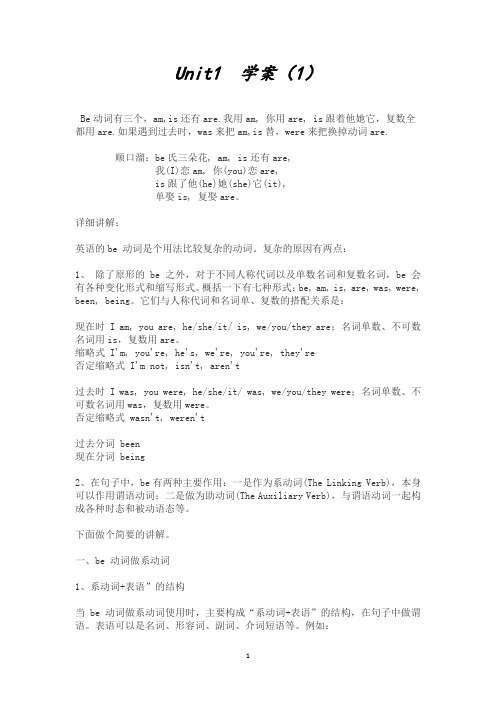
Unit1 学案(1)Be动词有三个,am,is还有are.我用am, 你用are, is跟着他她它,复数全都用are.如果遇到过去时,was来把am,is替,were来把换掉动词are.顺口溜:be氏三朵花, am, is还有are,我(I)恋am, 你(you)恋are,is跟了他(he)她(she)它(it),单娶is, 复娶are。
详细讲解:英语的be 动词是个用法比较复杂的动词。
复杂的原因有两点:1、除了原形的 be 之外,对于不同人称代词以及单数名词和复数名词,be 会有各种变化形式和缩写形式。
概括一下有七种形式:be, am, is, are, was, were, been, being。
它们与人称代词和名词单、复数的搭配关系是:现在时 I am, you are, he/she/it/ is, we/you/they are;名词单数、不可数名词用is,复数用are。
缩略式 I'm, you're, he's, we're, you're, they're否定缩略式 I'm not, isn't, aren't过去时 I was, you were, he/she/it/ was, we/you/they were;名词单数、不可数名词用was,复数用were。
否定缩略式 wasn't, weren't过去分词 been现在分词 being2、在句子中,be有两种主要作用:一是作为系动词(The Linking Verb),本身可以作用谓语动词;二是做为助动词(The Auxiliary Verb),与谓语动词一起构成各种时态和被动语态等。
下面做个简要的讲解。
一、be 动词做系动词1、系动词+表语”的结构当be 动词做系动词使用时,主要构成“系动词+表语”的结构,在句子中做谓语。
表语可以是名词、形容词、副词、介词短语等。
教学中的互联网应用新标准小学英语六册Module2Unit1教案设计
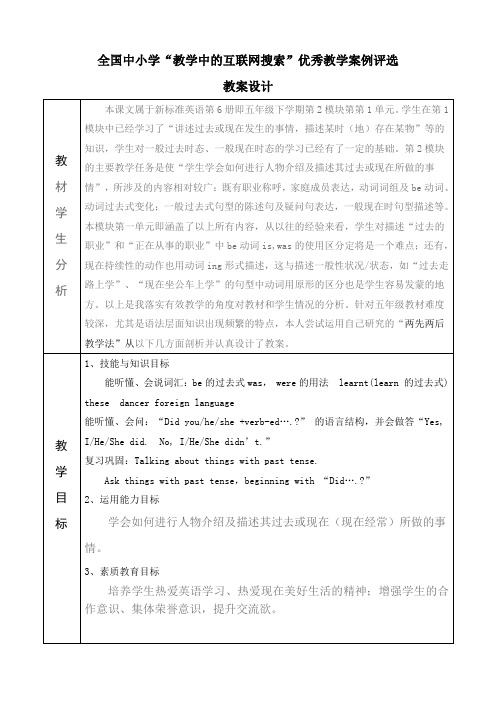
S: Yes, she did. /No, she didn’t.
T: She learnt English.
(如果学生是肯定回答,教师通过重复句子,引出learn的过去时learnt)
教
学
目
标
1、技能与知识目标
能听懂、会说词汇:be的过去式was,were的用法learnt(learn的过去式) these dancer foreign language
能听懂、会问:“Did you/he/she +verb-ed….?”的语言结构,并会做答“Yes, I/He/She did. No, I/He/She didn’t.”
教
学
难
点
词汇:be的过去式was,were的用法,foreign language的读法。
句型:“Did you/he/she+do….?”
“Yes, I/He/She did. No, I/He/She didn’t.”
“Subject+Verb-ed…”
教
学
方
法
两先两后教学法即先听后讲、先学后导。“教师先不教,让学生先试一试,学生在尝试中学习。老师只需提出问题,让学生通过听录音回答问题的基础上,自学课本和互相讨论,依靠自己的力量,去试一试,初步解决问题,找到问题所在,最后老师再作有针对性的指导讲解。
Have students underline the sentences and circle these words.
第三遍细听跟读录音,每句进行停顿,要求English.视频
新标准小学英语六册Module2Unit1教案设计

教
学
过
程
1、热身激趣,导入新课
(1)T: Do you like dancing?
S: Yes, I do. / No, I don’t.
Let one student act. Look, she is dancing.
/v?ct=301989888&rn=20&pn=0&db=0&s=25&word=she%20learnt%20English%20
Question 1:Who are they?
Question 2:What are they talking about?(课件展示)
(3)T: We are learning English now. But did your mother learn English?
S: Yes, she did. /No, she didn’t.
T: She learnt English.
(如果学生是肯定回答,教师通过重复句子,引出learn的过去时learnt)
听过去的故事,看现在的生活
/e/20111009/4e9103dc6c032.shtml
教
学
反
思
这节课我认真分析教材,设置教学重、难点,有明确的教学目标和采取适当的教学方法。
授课后从学生的反馈来看有以下几方面值得注意的问题:
1,重点句型提炼时间较少,部分学生可能不能把握。
新标准英语第6册Module2 Grandparents
Unit 1 She learnt English.
外研版小学英语第六册第二模块第一单元教案
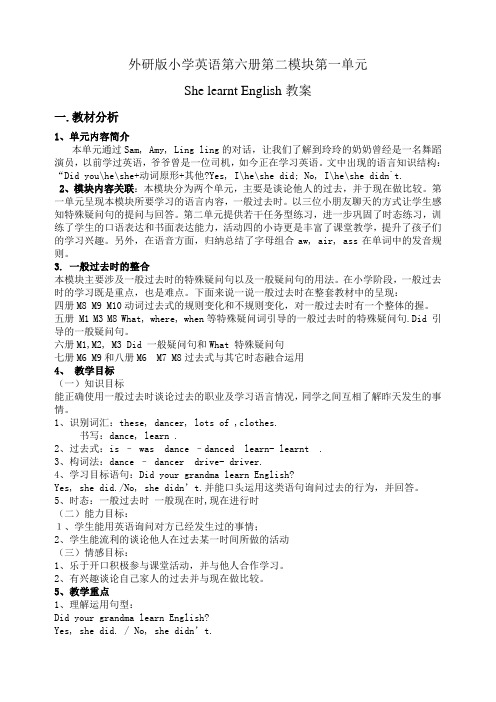
外研版小学英语第六册第二模块第一单元She learnt English教案一.教材分析1、单元内容简介本单元通过Sam, Amy, Ling ling的对话,让我们了解到玲玲的奶奶曾经是一名舞蹈演员,以前学过英语,爷爷曾是一位司机,如今正在学习英语。
文中出现的语言知识结构:“Did you\he\she+动词原形+其他?Yes, I\he\she did; No, I\he\she didn`t.2、模块内容关联:本模块分为两个单元,主要是谈论他人的过去,并于现在做比较。
第一单元呈现本模块所要学习的语言内容,一般过去时。
以三位小朋友聊天的方式让学生感知特殊疑问句的提问与回答。
第二单元提供若干任务型练习,进一步巩固了时态练习,训练了学生的口语表达和书面表达能力,活动四的小诗更是丰富了课堂教学,提升了孩子们的学习兴趣。
另外,在语音方面,归纳总结了字母组合aw, air, ass在单词中的发音规则。
3. 一般过去时的整合本模块主要涉及一般过去时的特殊疑问句以及一般疑问句的用法。
在小学阶段,一般过去时的学习既是重点,也是难点。
下面来说一说一般过去时在整套教材中的呈现:四册M8 M9 M10动词过去式的规则变化和不规则变化,对一般过去时有一个整体的握。
五册 M1 M3 M8 What, where, when等特殊疑问词引导的一般过去时的特殊疑问句.Did 引导的一般疑问句。
六册M1,M2, M3 Did 一般疑问句和What 特殊疑问句七册M6 M9和八册M6 M7 M8过去式与其它时态融合运用4、教学目标(一)知识目标能正确使用一般过去时谈论过去的职业及学习语言情况,同学之间互相了解昨天发生的事情。
1、识别词汇:these, dancer, lots of ,clothes.书写:dance, learn .2、过去式:is – was dance –danced learn- learnt .3、构词法:dance – dancer drive- driver.4、学习目标语句:Did your grandma learn English?Yes, she did./No, she didn’t.并能口头运用这类语句询问过去的行为,并回答。
大连市2012“教学中的互联网搜索”优秀教学案例评选 张洁 新标准英语三起第六册 M2U1 She learnt English
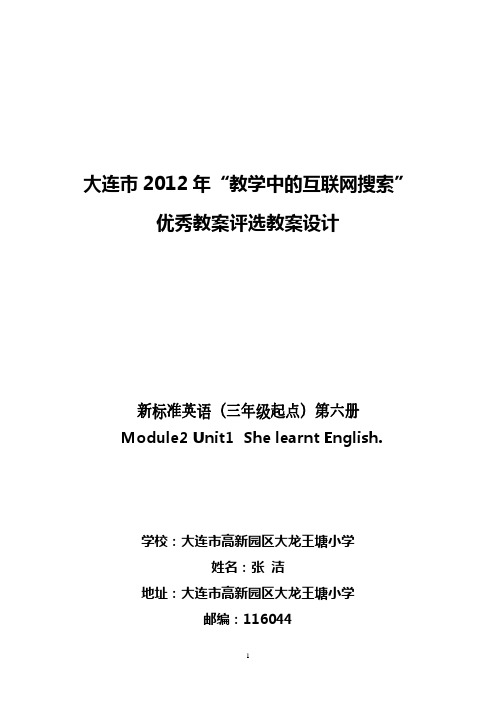
(3)Learn some important sentences:
Did your grandma learn English?Yes, she did./No, she didn’t.
2.Ability aims
(1)Students are able to describe the actions happened with the past tense correctly.
新标准英语第六册课文及翻译
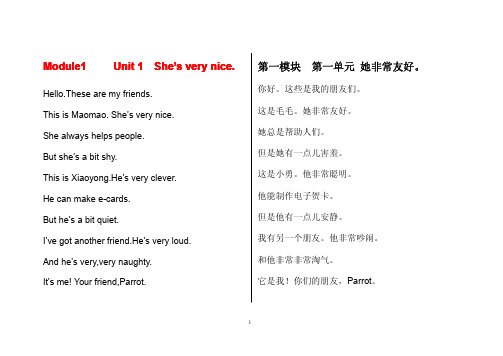
Module1Unit1SheShe’’s very nice. Hello.These are my friends.This is Maomao.She’s very nice.She always helps people.But she’s a bit shy.This is Xiaoyong.He’s very clever.He can make e-cards.But he’s a bit quiet.I’ve got another friend.He’s very loud.And he’s very,very naughty.It’s me!Your friend,Parrot.第一模块第一单元她非常友好。
你好。
这些是我的朋友们。
这是毛毛。
她非常友好。
她总是帮助人们。
但是她有一点儿害羞。
这是小勇。
他非常聪明。
他能制作电子贺卡。
但是他有一点儿安静。
我有另一个朋友。
他非常吵闹。
和他非常非常淘气。
它是我!你们的朋友,Parrot。
Unit2I’m going to help her.Activity1Parrot:My name’s Parrot.I’m helpful.This little girl can’t do her Maths.I’m going to help her.Girl:What’s ten plus eleven?Parrot:What’s ten plus ten?Girl:Twenty.Parrot:And one more?Girl:It’s twenty-one.Thank you,Parrot.第二单元我打算帮助她。
P:我的名字是Parrot。
我是有帮助的。
这个小女孩不会做她的数学题。
我打算帮助她。
G:十加十一等于几?P:十加十等于几?G:二十。
P:再加一个呢?G:是二十一。
谢谢你,Parrot。
Module2Unit1It It’’s very long. Look at this book.It’s about London.I’m from London.This river is very wide.And it’s very long.It’s the River Thames.It’s very tall.What is it?This is Big Ben.It’s a very old clock.And look at this big wheel.It’s very high.It’s new. It’s the London Eye.Eye?Like my eyes?Yes.It’s a big,round eye!Ahh!第二模块第一单元它非常长。
六上M2U1
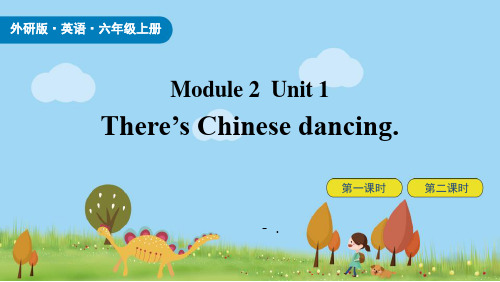
Chinese restaurants
Chinese shops
New words
sh
shop 商店 ship 轮船
shoes 鞋
Chinese dancing
China(中国) + town(市镇)= Chinatown (中国城,唐人街)
foot(脚) + ball(球)= football (足球)
dancing restaurants Then shop Sometimes
1. ——We can't go to the library now. It closes at 5 o'clock. —— Then let's go to the museum.
2. SometimesI miss my cousin in America. 3. I need a pen, so I will go to the shop . 4. We can see Chinese dancing in Chinatown. 5. I am hungry. Are there any restaurants ?
There is a map.
There is a basketball.
There are five apples.
There are four monkeys.
There are five books.
Listen and find out “There be…”
Simon: What are you doing, Daming?
Daming misses China. Simon will take him to Chinatown.
Watch and listen.
外研社新标准(一年级起)二年级上 Module 6教学设计

学生能结合已学知识知识,灵活运用I______ on ______.
Teaching Aids
教学辅助
ppt football
Teaching Methods
教学方法
情境法听说法交际法游戏法
Teaching Procedure
教学步骤
二次备课批准
Lesson 1
Teaching contents:Part 1/2
Song: (Module 5 unit 2)(Little teachers)
Step2: Review
Open the window/door
Point to the window/door/floor
ceiling/panda/dog/cat/bird/.
This is a blue cat~(colors)
教学内容分析
本单元是第一单元This is ______.的拓展与延伸That is a______.并结合前面模块学过的动物,颜色,教室物品等单词。培养学生的综合运用语言能力,对学生的能力要求较高。
Teaching Goals of the Unit
课时教学目标
知识目标:
1.词汇:全体学生能理解that, bag,
教学步骤
二次备课批准
Teaching contents: Part1/3/5/6
Teaching Procedure:
Step1:Greetings:
Good morning, boys and girls. Good morning, Nicole.
How are you? I’m fine.
What’s your name? My name is ___.
外研版新标准初二英语上册第六模块课文内容.doc
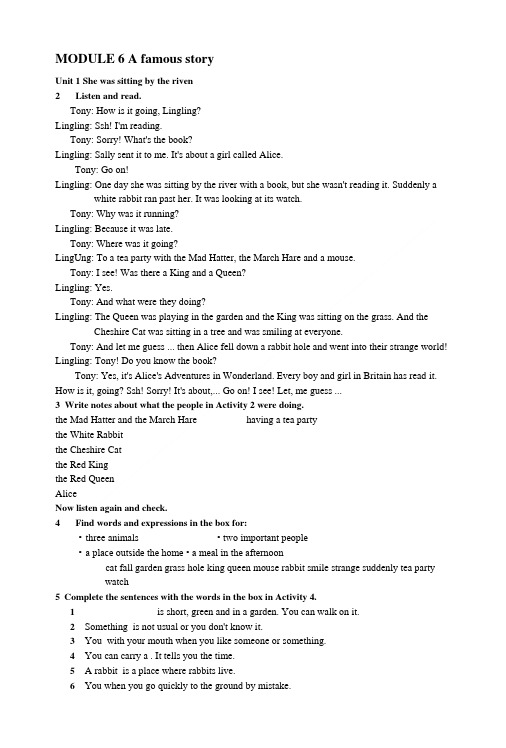
MODULE 6 A famous storyUnit 1 She was sitting by the riven2Listen and read.Tony: How is it going, Lingling?Lingling: Ssh! I'm reading.Tony: Sorry! What's the book?Lingling: Sally sent it to me. It's about a girl called Alice.Tony: Go on!Lingling: One day she was sitting by the river with a book, but she wasn't reading it. Suddenly a white rabbit ran past her. It was looking at its watch.Tony: Why was it running?Lingling: Because it was late.Tony: Where was it going?LingUng: To a tea party with the Mad Hatter, the March Hare and a mouse.Tony: I see! Was there a King and a Queen?Lingling: Yes.Tony: And what were they doing?Lingling: The Queen was playing in the garden and the King was sitting on the grass. And the Cheshire Cat was sitting in a tree and was smiling at everyone.Tony: And let me guess ... then Alice fell down a rabbit hole and went into their strange world! Lingling: Tony! Do you know the book?Tony: Yes, it's Alice's Adventures in Wonderland. Every boy and girl in Britain has read it. How is it, going? Ssh! Sorry! It's about,... Go on! I see! Let, me guess ...3Write notes about what the people in Activity 2 were doing.the Mad Hatter and the March Hare having a tea partythe White Rabbitthe Cheshire Catthe Red Kingthe Red QueenAliceNow listen again and check.4Find words and expressions in the box for:•three animals • two important people•a place outside the home • a meal in the afternooncat fall garden grass hole king queen mouse rabbit smile strange suddenly tea partywatch5Complete the sentences with the words in the box in Activity 4.1is short, green and in a garden. You can walk on it.2Something is not usual or you don't know it.3You with your mouth when you like someone or something.4You can carry a . It tells you the time.5 A rabbit is a place where rabbits live.6You when you go quickly to the ground by mistake.7When something happens, you don't know it's going to happen.Unit 2 The white rabbit was looking at its watch.2Reazd the start of Alice's Adventures in Wonderland and answer the questions.Alice was getting very tired. She was sitting with her sister by the river and her sister was reading a book. Alice had nothing to do. Once or twice she looked into her sistefs book, but it had no pictures or conversations in it. "And what is a book for,” thought Alice, "without pictures or conversations?"So she was thinking of making a daisy chain when suddenly a white rabbit with pink eyes ran by her.There was nothing strange about that. And she didn't think it was strange when she heard the rabbit say, "Oh dear! Oh dear! Fll be late!” But when the rabbit took a watch out of its pocket and looked at it, Alice got up. A rabbit with a pocket and a watch? She ran across the field after it. She saw it go down a large rabbit hole under the hedge.Then Alice went down after it and never thought about how she was going to get out again.1How was Alice feeling?2Where were Alice and her sister?3What was her sister doing?4Why didn't Alice like her sister's book?5What was Alice thinking of doing?6What happened next?7What did the rabbit say?8What did the rabbit do with its watch?9Why did Alice get up?10Where did the rabbit go?11What did Alice do?12How was she going to get out again?Learning to learn Books like Alice's Adventures in WOnderland and the adventures of Harry Potter are famous all over the world. Make a list of famous English books you'd like to read. Try to find out what each story is about and then read a short passage from it.Match the notes about Lewis Carrol1 and Alice Liddell with the questions.3Match the notes about Lewis Carroll and Alice Liddell with the questions.1What was Lewis CarrolTs real name?2What was he doing at the University of Oxford, England?3Who did Dodgson see in a garden?4What was Alice doing with her sisters?5What did they ask him to do?6What did Dodgson become with the Liddell children?7What were they doing by the river?8What did he tell them?9What did Alice ask Dodgson to write?10What did Dodgson write?11What happened to the real Alice?12When did Alices adventures with Lewis Carroll end?a They were having a picnic by the river.b Alice asked Dodsson to write the stories in a book.c He was teaching maths at the University of Oxford, England.d Alice was playing with her sisters.e Lewis Carrolfs real name was Charles Dodgson.f They asked him to take their photos.g Alice's adventures with Lewis Carroll ended when she grew up.h The real Alice grew up.i He wrote Alice's Adventures in Wonderland.j He told them lots of stories.k He saw Alice Liddell in a garden.1 Dodgson became good friends with the Liddell children.Unit 3 Language in useLanguage practiceOne day she was sitting by the river with a book, but she wasn't reading it.It was looking at its watch.Why was it running?Where was it going?A cat was sitting in a tree.1 Underline the correct form of the verbs.1Last night, I saw / was seeing my friend John. It was his birthday and he was having a party.2At five o'clock, my sister and I watched / were watching TV. There was a very good programme on.3Suddenly, all the lights in my house were going off/went off. There was a big storm outside.4I wasn't knowing / didn't know Mary until she started going to my school.5What did you do / were you doing at ten o'clock last night ?3 Write sentences about what you were doingLast Sunday, during the day ....At about seven o'clock last night ....This morning, on my way to school ....This time last year ....On Saturday, from about 12 noon to 2 pm ....8Complete the passage with the correct form of the words and expressions in the box. cat hole king queen rabbit smile strange tea party watchAlice met some strange people when she went to Wonderland. She was sitting near the river feeling tired when she saw a (1) looking at its (2). She jumped up and when the rabbit went down a (3) , she followed it. Then Alice came to a garden, and found a cat. When she spoke to the (4)she saw it was (5). When she met the Mad Hatter and the March Hare they were having a (6) . Finally, she met a (7) and a (8).。
外研版(一起)三下第六册第2模块B6 M2 U2

课后从课本13页第5题两幅图中选你自己喜欢的 一幅画出来,并试着配上英语句子或词组喜欢的 同学可以在你的班级学习群里展示一下哦!
课后小闯关
小朋友么,今天的知识都学会了吗? 让我们做几道练习吧。
Read ,choose and write (读一读,选一选,写一写)
A.Yes,it can. B.No,it can’t.
It’s amazing!
(令人大为惊奇的)
CItacnanitooppeenn. ?
?
We will
进而;继续;接着
Of course we will. You’ll love London.
You will love London.
Let’s listen and repeat together.跟读模仿。 注意语音语调都要试着模仿哦!
I will read the book about You will(将,将会)
London with Amy and Lingling.
Hello,e to my house.
You’ll see my new friend Little Six.
hill
fill 小山
填满
pill
We’ll go on the London Eye.
4.当然, 我们将要(去) 。
Of course, we will .
5.你们将喜欢伦敦。 You’ll love London .
必做作业:
1.You can retell the dialoge by yourself.( 能自己复述课文。
Read and number.自读课文,排序号。
Module6Unit2第1课时教案
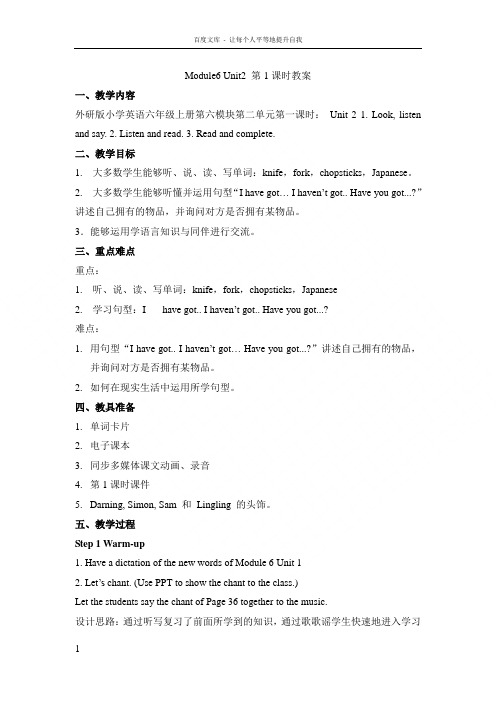
Module6 Unit2 第1课时教案一、教学内容外研版小学英语六年级上册第六模块第二单元第一课时:Unit 2 1. Look, listen and say. 2. Listen and read. 3. Read and complete.二、教学目标1. 大多数学生能够听、说、读、写单词:knife,fork,chopsticks,Japanese。
2. 大多数学生能够听懂并运用句型“I have got… I haven’t got.. Have you got...?”讲述自己拥有的物品,并询问对方是否拥有某物品。
3.能够运用学语言知识与同伴进行交流。
三、重点难点重点:1. 听、说、读、写单词:knife,fork,chopsticks,Japanese2. 学习句型:I have got.. I haven’t got.. Have you got...?难点:1.用句型“I have got.. I haven’t got… Have you got...?”讲述自己拥有的物品,并询问对方是否拥有某物品。
2.如何在现实生活中运用所学句型。
四、教具准备1.单词卡片2.电子课本3.同步多媒体课文动画、录音4.第1课时课件5.Darning, Simon, Sam 和Lingling 的头饰。
五、教学过程Step 1 Warm-up1. Have a dictation of the new words of Module 6 Unit 12. Le t’s chant. (Use PPT to show the chant to the class.)Let the students say the chant of Page 36 together to the music.设计思路:通过听写复习了前面所学到的知识,通过歌歌谣学生快速地进入学习状态。
Step 2 Preview老师提出以下问题,让学生思考:1. Have you got a pen friend?2. Has Darning got a knife from China?3. Has Sam got any stamps from China?4. Has Sam got any food from China?设计思路:这四个问题的设置,可以起到承上启下的作用。
